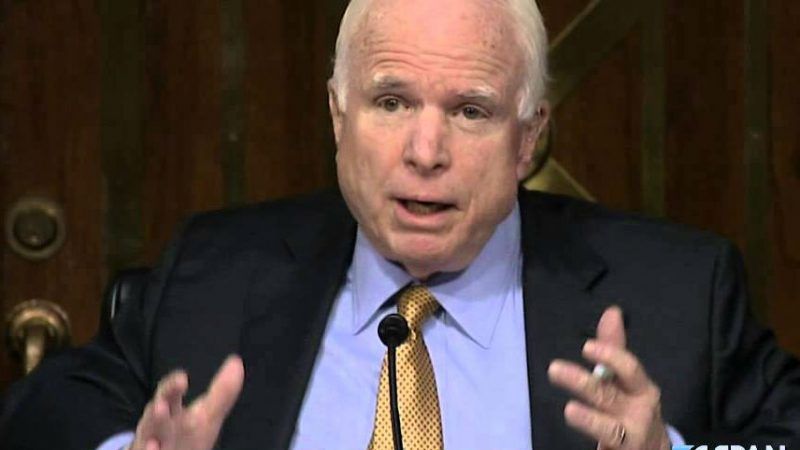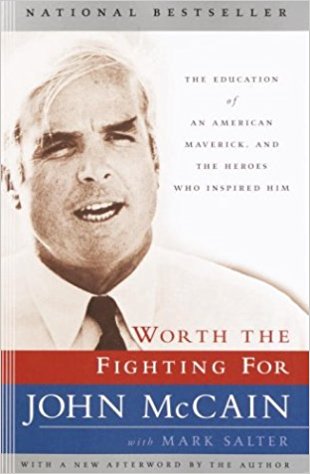John McCain's Flawed, Important Example in the Age of Trump
The cancer-stricken senator's eternal pursuit of honor and integrity are a welcome tonic in a tawdry age, even while his policy misjudgments helped pave the way for the new Republican politics he abhors.


John McCain would be the first to tell you that it does no good to whitewash our heroes. In fact, as he has stressed throughout his six published books and untold thousands of media interviews, it's the imperfections and missteps of our best protagonists, coupled with the arduous and even hopeless natures of their quests, that make them worth studying in the first place.
So as the senior Arizona senator grapples with brain cancer in the wake of blod-clot surgery, and the tripartisan tidal wave of sympathetic affection from Republicans, Democrats, and journalists overwhelms the strangled objections of sour contrarians, allow this critical ideological biographer of the man to suggest that it's precisely John McCain's mixture of high-minded virtue and low self-interest, of policy righteousness and interventionist overreach, that makes his a particularly educational example in the era of Donald Trump.
Underlying these past hours' outpouring of tributes is the sense that McCain is a pre-Trump throwback to honor and decency, that his irascible independence is precisely what our system of checks and balances cries out for as the 45th president crashes through norm after norm. There is some important truth to that—for instance McCain's global barnstorming tour to reassure America's nervous allies that United States foreign policy involves more than just the whims of its unpredictable commander-in-chief. Few people with half his 80 years would have the stamina for such travel, and even fewer would be driven by such patriotic fire to do what he considers the right thing.
But not all of McCain's policy judgments this year have been sound, not all of his motivations have been pure, and not many of Trump's excesses has he meaningfully opposed. The place where his instincts have gotten the worse of him on all of the above is precisely where his counsel is most taken seriously by the press: foreign policy.
In March, the same man being praised today as a beloved elder statesman made the hideously false charge that one of his main Senate antagonists, Rand Paul (R-Kentucky), "is now working for Vladimir Putin" because Paul reasonably opposed bringing the troubled ex-Yugoslav country of Montenegro into NATO. (If it were up to McCain, the transatlantic military alliance would now include Georgia and Ukraine, and conditionally Bosnia and Macedonia as well.)
During confirmation season, McCain, like all other GOP senators, waved through 90 percent of President Trump's picks, no matter how awful or inexperienced. For whom did he finally bring out the long knives? The perfectly qualified Office of Management and Budget director Mick Mulvaney, a former congressman and longtime fiscal conservative in good standing. What was the objection? That Mulvaney questions military as well as non-military spending, and is leery of open-ended missions abroad. "He's anti-defense," McCain charged at the time, inflammatorily. "He voted to remove all of our troops from Afghanistan….That's just bizarre."
Being a relentless hawk in American politics means almost never having to say you're sorry for errant belligerence and interventions gone wrong (though Tucker Carlson is belatedly attempting to change that equation). McCain sidekick Lindsey Graham (R-S.C.) will never not be invited on the Sunday chat shows to talk fixes to the foreign policy messes he actively egged on. But to a degree that I think many NeverTrump conservatives, and quite a few Hillary Clinton supporters, still have yet to honestly grapple with, the real-world deaths, global chaos, and long-distance quagmires we've been left with after all these fine-sounding Beltway plans are part of the reason we now have a vulgar insult-comic as president.
As Ed Krayewski pointed out two weeks ago, a fascinating new research paper found "significant and meaningful relationship between a community's rate of military sacrifice and its support for Trump….Trump significantly outperformed Romney in counties that shouldered a disproportionate share of the war burden in Iraq and Afghanistan." The president is nobody's anti-interventionist, but he is asking some of the right questions about Afghanistan, such as "I want to find out why we've been there for 17 years." The McCainite view keeps assuming U.S. military presence in various troubled spots for as long as it takes, and fie on those who should weaken our resolve. The foreign policy gap between the Washington consensus and the American public has been growing for some time now, and the interventionists have failed to meaningfully adjust.
Ever since finally shaking off his hard-earned Vietnam Syndrome and embracing what neoconservatives were for a while calling National Greatness Conservativism, John McCain has been declaring "war on the cynicism that threatens our public institutions." Many of his worst anti-individualist policy ideas have sprung from that impulse—regulating political speech, drug-testing teenagers, making national service mandatory—but set those things aside for a moment, and look at one key way that McCain has contributed to the very Trump-aggrandizing cynicism he disdains.
In 2006, McCain was the lead Republican working with Sen. Teddy Kennedy (D-Mass.) on President George W. Bush's longstanding goal of comprehensive immigration reform, which eventually went nowhere. In 2013, he was once again part of the Senate's bipartisan "Gang of Eight" to tackle the legislation, which also fizzled. And in 2016, he was decrying the "nativism" of Trump's immigration rhetoric. So what's cynical here? The years in between. Specifically, the election years.
In 2007, facing a conservative backlash that very nearly sunk his presidential hopes, McCain punted the Kennedy-cooperation job in early 2007 to the then-junior Arizona Sen. Jon Kyl, and then began openly campaigning against immigration bills he'd previously cosponsored, such as the DREAM Act. And in 2010, facing a primary challenge from immigration hawk J.D. Hayworth, McCain starred in one of the most gruesomely cynical TV commercials you will ever see, with unforgettable tagline "complete the danged fence." When you play the base for rubes, eventually they develop an attraction to outsider politicians who campaign against the broken promises of the establishment. (See these posts of mine from 2013 and 2016 for more about McCain's immigration flip-floppery.)
One of the things that makes McCain so irresistible to political journalists is that he willingly admits the kind of character flaws that produce his lower moments in politics. "I have craved distinction in my life," he confessed in his fascinating 2002 political memoir Worth the Fighting For. "I have wanted renown and influence for their own sake. That is, of course the great temptation of public life. Few are immune to its appeal. The desire to be somebody has driven many a political career much further than the intention to do something. I have never been able to conquer it permanently, but I have tried."
It's the I-have-tried part that I think offers us a more positive path forward, in contrast to the more negative observations above. It is not hard to sift through a long and sporadically sanctimonious public record and find serial instances of hypocrisy, especially when the politician happily volunteers them. But in an age personified by the Twitter shrug emoji and the world-weary observation that "everybody lies," it's good to have near the national discussion someone who is embarrassed enough by his own lies that he feels compelled to apologize for them, saying stuff like, "I chose to compromise my principles. I broke my promise to always tell the truth.''
"The worst decisions I have made, not just in politics but over the course of my entire life," he co-writes (along with perennial co-author Mark Salter) in his 2007 book Hard Call, "have been those I made to seek an advantage primarily or solely for myself." He has yielded to that temptation often, more than he publicly admits, yet he's haunted by the gap between honor and performance, and motivated to do better.
I would rather my political representatives agreed with my (admittedly idiosyncratic) policy preferences, and that they weren't hypocrites. But on a comportment level, give me the guy who at least recognizes the lodestar of virtue in the first place, is capable of admitting error, and burns with a genuine patriotic energy.
I wish John McCain would have retired in November, and enjoyed the company of his family, a few of whom I know a bit. I wish him the best in coping with the tough medical diagnosis he's been dealt. And though the U.S. Senate doesn't exactly need more foreign policy uber-hawks, American politics in 2017 could stand to have more people who are at least haunted by a sense of decency.


Show Comments (116)